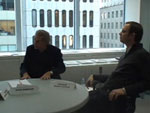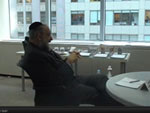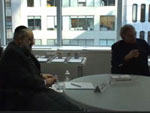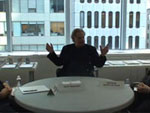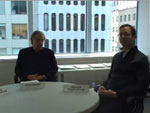David Birnbaum: Welcome you to colloquium, it’s now December 8th 2010, Wednesday morning, 589 5th Avenue right opposite Rockefeller Center with a colloquium on Summa Metaphysica, the two book series God of Evil and God of Good. God of Evil was published in 1988; God of Good was published in 2008. We have with us professors Lawrence Schiffman and Micah Gottlieb, currently at NYU and Princeton respectively this year. Okay so the ground rules are there are no holds barred, nothing is off the table and logic and truth are the supreme ultimate goals here. So I’d like to start off with throwing out to these distinguished professors, getting rolling, what are some components of Summa Metaphysica which might have intrigued you? Let me start with Professor Schiffman.
Lawrence Schiffman: Well in rereading the second volume I’ve been kind of intrigued by this idea of God realizing his potential for a variety of reasons. Normally, we assume in Jewish philosophy which has been very much influenced by Aristotelian and also Jewish mysticism is actually very much influenced too by lot of this by Aristotelian. We assume that it’s not really possible for God to change and it appears that if you speak of God who is reaching his own potentials that there’s some kind of a progress that’s going on within God something like that, and normally this would be considered to be rather let’s be honest strange. Now in this case it seems like it’s an extension now of the overall assumptions of Maimon that the growth of the human enterprise and of the world around us is — really playing out one’s potential but with the divine it’s a rather original idea and needs some clarification.
David Birnbaum: Professor Gottlieb.
Micah Gottlieb: Well I think what I was struck first of all with volume one is the real profound optimism in the book. You’re facing the issue of evil and the holocaust is clearly a very important component of this, it’s kind of prime in your — in your mind and what I was struck by was this profound sense of optimism about human potentiality, human potential and also really this kind of the faith in human progress which I think, you know, as a very bold — is a very bold move to make and I think a lot of — a lot of people have shied away from embracing the notion of progress after the holocaust. And I think that comes out even more strongly in volume two where again just to repeat what Professor Schiffman said that again this — this idea of the progress in the development of the individual’s capacities that is giving this kind of cosmic dimension which actually I mean there are roots, you know, you’ve seen this kind of concept in German philosophy Lessing, Hegel, things like this and thinkers like this. So but it’s kind of interesting to bring this into — into the Jewish — into the Jewish context.
David Birnbaum: So, first my plan is to touch base with Professor Schiffman about his thoughts, when I get back to you maybe you can extrapolate a little bit of vis-à-vis even minimally because Lessing and Hegel how they might dovetail into this or how I might dovetail into them, fair enough? So, we have to be careful we know we have to play by the rules. So yes, Professor Schiffman, yes I would say that normative orthodox Jewish dogma would bristle at the concept of an evolving divine and respectfully and I — you’re not challenging the genuineness of my metaphysics, you’re pointing out that it might not be consonant, you’re implying what not be consonant with normative orthodox Jewish dogma and you’re right I agree. I feel that there is a whole discussion is it even a mainstream Jewish metaphysics or is there just a theology detached from foundation metaphysics which will be my position which I suspect without putting you on the spot might be your position. But back to your point I feel that and I, and I’ve wrestled with this issue, you see, and you’re correct, book one is very meticulously careful to be within the boundaries of classic mainstream Jewish dogma and it’s stamped, sealed, approved by a roster of orthodox Rabbis as well. With book two which was written roughly 15 to 20 years later I decided to start with a blank slate and detach of any dogma or theology and see where — see where this path took me. Luckily for me it dovetails well with book one, however, it diverges from classic contemporariness of orthodox dogma.
Lawrence Schiffman: Actually the question that I would be concerned about is not whether it diverges from somebody’s dogma but whether or not the reason that that dogma was developed is philosophically necessary, okay. Now that’s the question which actually Professor Gottlieb probably knows more than I do about, however, my understanding is that the reason why some of these conclusions were reached in the Middle Ages and earlier by Aristotle is because actually they’re logically correct that is not only true because sometimes they built on assumptions that we no longer accept, but sometimes they seem to be logically correct but the question is how you can define if you define changing God, so therefore you have an imperfect God. So the question is —
David Birnbaum: I am evolving God.
Lawrence Schiffman: — not yet perfect God.
David Birnbaum: I’ve evolving perfection. On some level it happens around the semantics can perfection be evolved and you could have 400 university courses on that subject, can perfection be evolving. Okay remember the Torah says it was God, the Torah does not say it was a perfect God. I don’t want you to have a heart attack at that statement but I want to make a case that the God of Israel does make adjustments and the God of Israel never self asserts that the God of Israel is perfect. If we say — if we say that perfection means not evolvement, so this becomes evolvement but getting back to your main — and now getting back to your main point. We tend to hold Aristotle Maimonides on a high — very high pedestal whereas respectfully their metaphysics are fatally flawed, demonstratively fatally flawed and there are major gaps in their respective metaphysics and if they were so strong they’ll be more prominent to that. So what do I mean by that. From my humble perspective, as your humble everyday student metaphysics needs to address certain key points and I call these grand philosophy points also known as the questions five or seven year olds ask and never get answers to. Okay here are some of basic questions, if there is a God, if there is a classic God of Israel where did this God from? If there is a classic God of Israel why is there a holocaust? If there’s a classic God of Israel why have you and I never directly encountered this God of Israel? And if there’s a classic God of Israel where is this all happening? Next, on the other side of the legend if there was no God and no classic God of Israel where did cosmos come from? If there was no God why is there a cosmos? If there’s no God where is cosmos headed? And whether or not there is a God why is there gross evil? So from my humble perspective neither Aristotle nor towering [ph] Maimonides and all deal with these issues adequately or even [cross talk]
Lawrence Schiffman: That is — that is exactly the question I’ll explain to you why.
David Birnbaum: Okay.
Lawrence Schiffman: Because the question is on some of this whether or not the points made on a particular issue are correct and there’s no question when you read the Bible and you read the Midrash and certainly you read Jewish mystical literature, there are let’s call the changes of mind of God, the
re are reactions to newer circumstances, there are even things that you would call if you didn’t have some kind of theological baggage errors or mistakes in the way the narrative tells it, okay, but that is exactly the issue because off all questions you raise there’s one that sticks out from all the others and that’s where did this God come from. Now with all these questions that you mentioned in each one of them we can argue that the particular issue one way or another and it wouldn’t necessarily matter but the question is where would God, is God come from what. Now, according to — unless I misunderstand —
David Birnbaum: So explain that why does that stand out?
Lawrence Schiffman: Because basically the classical assumption was always that God has always been there and if God preexist that would he create because it’s logically impossible for God to create something which existed before. Now that might not be true if you live in a time and admittedly this gets to the whole question that we have to address sometime. A lot of what we’re talking about is how we understand things around us and not what they really are, okay, however the point is that those assumptions at least within the way most of us talk when we mention God or actually correct assumptions because we assume that the God and I believe you write this is essentially the creator of universe. Now, if that’s the case that’s the answer to the kid’s question that you mention somehow or the other even if we don’t know how then if the potential is developing of God overtime then that will have a starting point. If it doesn’t have a starting point then it doesn’t seem to make any sense to develop from A to B. So therefore if there has to be the starting point, right, that’s what you need to explain; you need to explain how there is a starting point. Now one other point about this which is that in a certain sense the reason that this question differs from all of the other questions is because classically at least in the whole western religious tradition it is like so fundamental and if they say I agree with it, then fine, but you do have to address it.
David Birnbaum: I agree with you a thousand trillion percent. Okay, I’m going to come back to you with your permission after Professor Gottlieb perhaps flushes out some of his remarks before.
Lawrence Schiffman: Right. You might be able to weigh some of mine better than I do.
Micah Gottlieb: Well, actually I would want to maybe come down from the lofty heights of metaphysics down to politics and maybe even religious polemics because I think that there has been classically a strong resistance on the part of many Jewish thinkers to embrace the notion of progressive development of humanity, and the reason for that is we can really talk about it in two directions. One is in terms of the sense that this is an adaptation of a Christian argument that the sense of supersession, the sense of the later generations, understanding more than the earlier generations and I — the question is — and that’s always among Jewish thinkers has been a very problematic position, something that they’ve resisted. The second question has to do with the — the second thing has to do with the issue of God’s justice and the question is if God is just, you might thing that that should evolve the idea that in every generation people have an equal opportunity to perfect themselves but the notion of kind of a progression education of — progressive education of humanity seems to imply that people of later generations have more of an opportunity to perfect themselves and to fulfill themselves, I think is one the term that you use than individuals in earlier generation and so that was seen by certain figures like Moses Mendelssohn as contravening divine — divine justice, divine goodness.
David Birnbaum: Okay, so you have opened up 300 discussions right there.
Lawrence Schiffman: [inaudible 12:59] in progress.
For David Birnbaum philosophy, metaphysics, see also MIT-Birnbaum v. Cambridge
